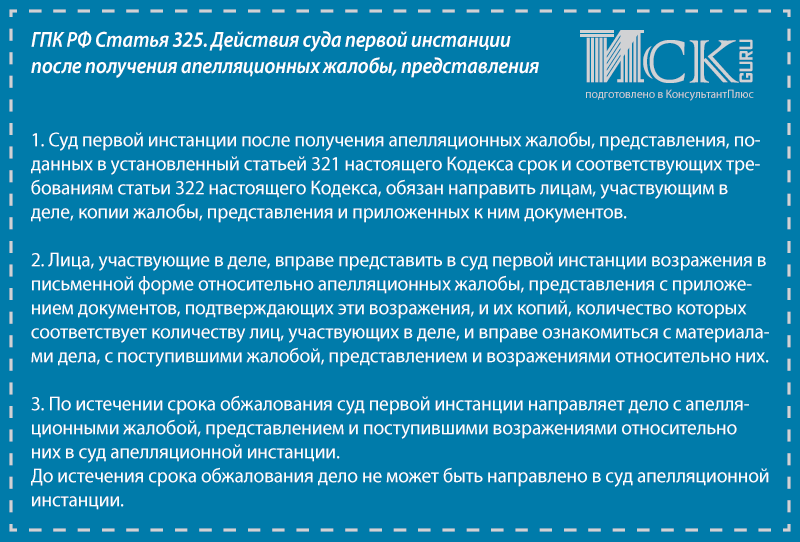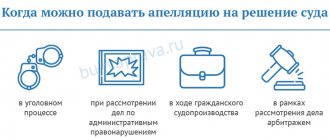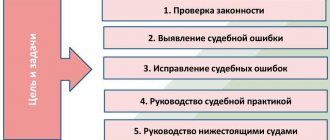Free legal consultation!
Not only district and arbitration authorities are involved in resolving controversial issues in court. Some of the claims fall within the jurisdiction of the magistrate's court.
They are responsible for sentencing in cases such as:
- A number of administrative offenses.
- Some civil disputes.
- Minor crimes.
The legality of the verdict is verified by appeal. Let's take a closer look at how to appeal the decision of the magistrate.
What is the order
Based on the Code of Civil Procedure of the Russian Federation (Article 320), a decision of a magistrate can be appealed only if it has not yet entered into legal force. The following have the right to appeal:
- Plaintiff.
- Defendant.
- State prosecutor.
- Other interested parties directly related to the trial.
An appeal to a court in a civil case involves preparing copies of documents for all participants in the proceedings.
The procedure for appealing the decision of the magistrate does not allow the indication of other requirements that were not previously identified. However, the applicant has the right to use additional arguments in his favor. At the same time, he should explain the reason why this information was not provided at the time of the first consideration of the case.
The result of a repeated study of all the circumstances is the issuance of one of the acts:
- Sentence.
- Resolution.
- Definition.
Appeal procedure
In the conclusion of each judicial act issued by the presiding judge, the process of challenging it, depending on the type of legal proceedings, is necessarily described.
The law limits the content of appeals. Thus, the appellant is prohibited from introducing into the document new claims that differ from the original claim. Any additional documentary evidence of the applicant's correctness will be attached to the materials, provided that they were previously unknown and if the appellant justifies their appearance.
Regardless of the type of case, the procedure for appealing the decision of the magistrate takes place in the district court whose territory the court that issued the contested verdict belongs to.
There are not a large number of civil cases before justices of the peace. This instance considers disputes where the amount cannot exceed 50 thousand. In addition, magistrates conduct uncontested cases, the result of which is the issuance of an order (writ proceedings) to recover up to half a million rubles.
Civil proceedings end with the issuance of one of the following acts:
- definition;
- resolution;
- solution;
- order.
Some of them are appealed in a specific way:
- Court orders. You cannot appeal an order. It can be canceled by the presiding officer within 10 days after issuance, or challenged in cassation if the cancellation is refused or the deadline is missed.
- Interim acts, against which private complaints are filed within 15 days. Art. 331 of the Code of Civil Procedure provides two reasons for challenging the rulings of magistrates:
- direct indication of the procedural code;
- Further consideration of the dispute is impossible.
There are no separate conditions for filing a protest against other acts; the procedure is standard. You can challenge them in the district court if:
- significant circumstances of the case have not been proven;
- the process took place in the absence of any participants, due to their lack of notification;
- there are subjects in the case who are not parties, but their interests were affected;
- in the absence of the chairman’s signature;
- if the magistrate made a deliberately illegal decision;
- in the presence of other violations established by Art. 330 Civil Procedure Code.
Appeal to cassation is possible only subject to preliminary consideration in the appeal.
The consideration of administrative cases is also within the competence of the global level. In this case, the timing and process of challenging depend on the type of violation that caused the proceedings.
The review procedure is regulated by Ch. 30 Code of Administrative Offenses of the Russian Federation:
- The review is carried out by the district authority.
- The deadline for filing a petition (complaint) is 10 days.
- The complaint is transferred to the global level, then redirected to the regional level (1-3 days). It is permitted to file directly with the district court.
- The district authority makes the following decision regarding the resolution:
- change;
- cancel (terminate, refer for new consideration);
- revise in part or in full.
If you disagree with the conclusions of the district court, the complaint is transferred to a higher (cassation) level according to the same rules.
Criminal proceedings
Challenging the results of criminal trials occurs in a uniform manner established by the Code of Criminal Procedure. At the same time, when appealing the verdicts of the magistrate, Art. 323 of the Code of Criminal Procedure, establishing the features of the appeal:
- only acts that have not entered into force are contested;
- the review process takes place in the district court;
- 10 days are given to submit the application;
- the content of the complaint is stated in Art. 389.6 Code of Criminal Procedure;
We invite you to read: Court practice did not notify the insurance company according to the European protocol
Reasons for revision:
- discrepancy between the conclusions of the presiding officer and the provisions of the case;
- violation or erroneous application of laws;
- violation of the principle of justice;
- failure to comply with pre-trial procedures;
- other reasons specified in the Code of Criminal Procedure.
A distinctive feature of such cases is the possibility of repeated appeal through the appellate procedure. Only the victim can use it. You can apply if a complaint was previously filed by the convicted person.
You can complain about the verdict as a whole, or about individual points.
You can challenge the outcome of the appeal at:
- cassation - regional court;
- supervision - the Supreme Court of the Russian Federation.
If you have any questions, you can ask them free of charge to the company’s lawyers in the form provided below. An answer from a competent specialist will help you make the right decision.
Cancellation of a decision in an administrative or civil case
To appeal a decision, you must send the necessary list of papers to the authority. They will then be transferred to a territorially appropriate district court, where the subsequent consideration of the case will take place. The procedure is the same for all proceedings.
According to the specifics of civil disputes, sometimes the final decision replaces a court order. After a while, the latter can be re-qualified as an executive document. To challenge it, you must write an appeal addressed to the judge. If the arguments of the dissenting participant in the process are convincing, the case is subject to re-examination.
To stop the entry of the appealed verdict into full force, you can focus on the following points:
- Substantive law (if legislative acts were not complied with).
- Procedural law (if the procedure for considering the claim was violated).
After hearing a civil complaint, the district judge may:
- Overturn the magistrate's verdict.
- Change a previously made decision.
- Make a new ruling.
- Refuse the request for reconsideration of the case.
The outcome of the consideration of an administrative dispute may be:
- Mitigation of sanctions by reducing the amount of the penalty.
- Closing the proceedings and canceling the fine.
- Submitting all materials for re-consideration.
In the latter case, a different judge will handle the proceedings. According to judicial practice, a verdict imposing an administrative fine is often canceled due to the expiration of the prescribed period. It is possible that the complaint will be rejected at the stage of the district hearing.
How to file an appeal against a district court decision
An appeal is drawn up after receiving and studying a reasoned court decision.
This will allow you to understand the logic of the court when making a decision, evaluate its arguments and criticize the circumstances established by the court. Without a reasoned decision, the appeal will be superficial and meaningless. Sometimes, if the court delays making a reasoned decision, a short appeal is drawn up, which formally should take into account all the requirements for the appeal, but may not contain a complete substantiation of the applicant’s position. Such a complaint is drawn up in order not to miss the deadline for appeal. Then it will be possible to draw up an additional appeal, already with a full justification of the position of the applicant of the complaint.
The content of the appeal must comply with the requirements of Article 322 of the Code of Civil Procedure of the Russian Federation.
The appeal must indicate the name of the court where it is filed. The name of the court for appeal is usually indicated at the end of the court decision, in the following form: “The court decision can be appealed within 1 month to ..... court.” If this name is not indicated, you can always find it yourself.
Thus, decisions of district and city courts are appealed to regional, regional, and republican courts. For example, in the Moscow region, appeals are filed with the Moscow Regional Court, in the Krasnodar Territory - with the Krasnodar Regional Court, and in Tatarstan - with the Supreme Court of the Republic of Tatarstan. In St. Petersburg and Moscow, appeals against decisions of district courts are filed with the St. Petersburg or Moscow City Court, respectively.
The appeal shall contain the full details of the applicant filing it. This is the last name, first name and patronymic without abbreviations, sounding as indicated in the passport. This is the address of the applicant’s place of residence or location; to this address the court will send notice of the time and place of consideration of the case in the appellate instance.
The complaint must indicate its name - Appeal against a court decision, so that the court has no reason to mistake it for another document. The court decision that is being appealed must be indicated. The name of the court decision must contain the date the decision was made, the name of the court that issued it, the details of the plaintiff and defendant, and the essence of the plaintiff’s claims.
In the descriptive part of the appeal, it is necessary to provide the reasons why the applicant does not agree with the court’s conclusions and considers the court’s conclusions to be incorrect.
When writing a narrative, you can simply describe why the court decision seems to the applicant to be illegal and subject to change or cancellation. But it is better to take as a basis the grounds for canceling the decision listed in Article 330 of the Code of Civil Procedure of the Russian Federation. Having found suitable grounds for cancellation, you can fill them with content, taking into account the specific circumstances of the civil case.
There is no need to reiterate the court's decision in the appeal. It is already in the case, the judges on appeal will definitely familiarize themselves with it; citing excerpts and quotes from the decision will simply clutter the text of the complaint and make it difficult to understand. Try to make the descriptive part brief, in essence, so that it is clear what points the court of second instance should pay attention to, what exactly the applicant does not agree with. From the practice of lawyers, a good content of an appeal would be a text of no more than 3 pages of printed text.
After the grounds for cancellation, the text of the appeal must contain the requirements stated by the submitter of this complaint. Requirements cannot be arbitrary. they must comply with the powers of the appellate court (Article 328 of the Code of Civil Procedure of the Russian Federation). It is better to bring your requirements completely identical to those. which are specified in the law.
Thus, in an appeal, the following demands can be made:
- cancel the decision of the court of first instance completely and make a new decision in the case;
- cancel the decision of the court of first instance in part and make a new decision in the case;
- change the decision of the court of first instance in whole or in part and make a new decision on the case;
- cancel the decision of the court of first instance completely and terminate the proceedings;
- cancel the decision of the court of first instance in part and terminate the proceedings in part;
- cancel the decision of the court of first instance in whole or in part and leave the application without consideration in whole or in part.
When a partial cancellation or change of a court decision is required, the appeal indicates in which part the applicant requests to cancel or change the court decision.
The above requirements correspond to the powers of the court of second instance, other demands cannot be stated, this will contradict the requirements of the procedural law and they cannot be considered by the court of appeal.
We suggest you read: How to divide an apartment with a mortgage during a divorce, how to divide a mortgaged apartment during a divorce, how to divide a mortgage during a divorce, judicial practice
The requirements in the appeal are indicated after the words: “I ask.” It is better if several requirements are numbered and divided among themselves. If a new decision is required in the case, then the applicant must indicate in the requirements how it should sound. For example: “Make a new decision on the case, in which the plaintiff’s claims are completely rejected.”
Cancellation of a verdict in a criminal case
An appeal in a criminal case is possible if the verdict has not yet acquired legal status. Otherwise, only a cassation appeal is permissible.
The addressee of the document is one of the judicial authorities mentioned in the Code of Criminal Procedure of the Russian Federation (Article 401.3). All participants in the trial have the right to file a cassation, regardless of the admission of guilt of any of them. This means that even an acquitted defendant can appeal the verdict for personal reasons.
Theoretically, you can send an appeal to the judge after the deadline has expired. To be accepted for consideration, the applicant must provide compelling reasons for missing the allotted period.

How to compose a document
In order for an appeal against a magistrate’s decision to be accepted for consideration, it must be drafted correctly. The text of the paper is regulated by Art. 325 of the Code of Civil Procedure of the Russian Federation and must contain the following information:
- The name of the district judicial authority to which the document is sent.
- Information about the applicant (full name, address, passport details).
- The essence of the application (for example, challenging a verdict on alimony).
- Grounds for appeal.
- List of attached documents. This includes a power of attorney (if the complaint is handled by a representative of the interested party), etc.
Filing objections to a court decision involves paying a fee, but a number of citizens are exempt from this procedure (based on Article 333.37 of the Tax Code of the Russian Federation). These include the following groups of persons:
- Representatives of government authorities.
- Applicant defending children's rights.
- Copyright applicant.
- Citizens with 1st, 2nd gr. disability.
- Consumer Advocates.
Time limits for challenging a verdict
The deadline for filing an appeal against the decision of the magistrate depends on the specifics of the case under consideration.
The law establishes the following deadlines:
- Code of Administrative Offenses of the Russian Federation Art. 30.3 – administrative matters – 10 days;
- Code of Civil Procedure of the Russian Federation Art. 321 – civil cases – 30 days;
- Code of Criminal Procedure of the Russian Federation Art. 323 – criminal cases – 10 days.
The time limit for appeal does not begin immediately after the decision is made. During the announcement, only the part of the verdict containing the conclusion (resolution) is drawn up. For subsequent transfer to the office, it is necessary to draw up a part describing the circumstances of the dispute (motivation).
The appeal is submitted for consideration through the court in which the contested verdict was issued (with the exception of administrative cases). The interested person sends a complaint to the magistrate, after which he transfers it to the next level court, in this case the district or city. After accepting the complaint, the district authority has two months to consider the complaint. Such terms are provided in cases of challenging the results of civil and administrative proceedings.
For petitions for review of verdicts (sentences) in criminal trials, the deadlines are different. The protest is submitted within 10 days, the time for its consideration is reduced to 15 days.
If the final date of the appeal coincides with a non-working day or holiday, the end of the period is postponed to the first working day after the weekend.
In cases where an interested citizen, for good reason, misses the deadline for filing a protest, he is given the opportunity to restore these deadlines. Good reasons for skipping are:
- the appellant's illness;
- long-term business trip;
- force majeure;
- delay in issuing a judicial act;
- failure due to the fault of the postal service.
When trying to restore the deadline, any other basis may appear if the appellant has documentary evidence of the situation.
If the interested citizen does not have valid reasons to restore the deadline for challenging the act in an appeal, the verdict will enter into force, and it can only be challenged in the cassation instance.
Deadlines for filing and consideration of an appeal
The appellate court has the right to return his complaint to the applicant if the necessary criteria were not taken into account during its preparation. The expiration of the filing deadline is also a reason for returning the document.
The period within which you can raise your objections varies based on the category of proceedings. In a civil case, the period for appealing a decision made by a magistrate is 30 days. This period starts from the day following the day of the final decision.
The appellate authority is obliged to study the complaint and make a decision on it within 2 months. These deadlines are similar for cases falling into the category of administrative offenses. Please note: in the latter case, not 30, but only 10 days are allotted for filing objections.
You can also appeal a sentence passed in a criminal case within 10 days. After transferring the appeal to the district court, the judge has 15 days to consider it. At the end of this period, the first hearing of the case must occur.
Preparing an application to challenge can sometimes be a lot of trouble. Contacting a lawyer will help you avoid mistakes and inaccuracies.






